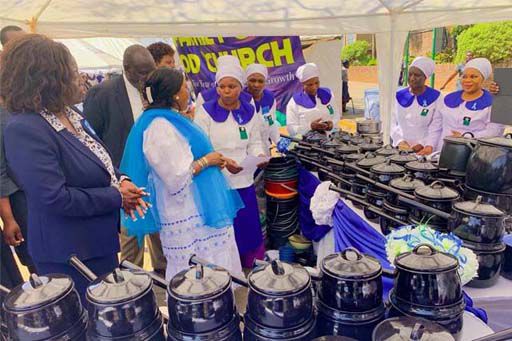As Africans, we practice ubuntu. It is not about me, it’s about us. I am part of an ecosystem of other people that sacrificed their time, their resources for me. And we do the same.
This profile is a part of our “Philanthropists in Action” case study series, which looks at emerging trends in the philanthropy landscape, as the ESG agenda and creating social impact climb the priority list of Family Offices and ultra-high net worth individuals (UHNWIs) around the world.
“Philanthropy and family businesses have been at the heart of African culture for generations,” says Tsitsi Mutendi, Co-founder of the not-for-profit African Family Firms (AFF). “They sustain families, friends and neighbors, often growing into multi-billion-dollar enterprises.”
She explains, the practice of giving reflects the spirit of Ubuntu, recognizing that the wellbeing of one is deeply connected to the wellbeing of others.
Tsitsi Mutendi is a third-generation entrepreneur, and in addition to her leadership of AFF, manages a successful publishing company and a Montessori school.
She follows in the footsteps of her parents, grandparents, and her in-laws the Mutendi family, who built a successful church, as well as a number of successful family-managed businesses. Philanthropy has been at the heart of the Mutendi family for over 100 years.
“Ours was a home that was always full of children that needed a place to stay, someone to talk to, or to help with schooling,” says Tsitsi.
Family business in Africa has not always received its fair share of attention. Despite sitting at the economic heart of the African continent, creating wealth for communities, and driving philanthropic activity, African family businesses are sometimes overlooked, under-documented, and unsupported. That is changing, driven by the passion, enthusiasm, and unending efforts of community leaders like Tsitsi.
AFF was established a little over 2 years ago as a not-for-profit organization to support and facilitate the continuity of African family businesses across multiple generations.
“The world is now looking at the continent because it is the last frontier,” explains Tsitsi. “We have so many resources and the youngest population on earth. We have so much, yet other people are identifying what we have.”
Tsitsi explains that creating the AFF, was about recognizing that the conversation in Africa has to shift from political to economic.
“We have to identify what we have, start learning from the mistakes of others, and create our own narrative, identifying the things we’ve done well,” says Tsitsi.
Tsitsi’s approach to philanthropy demonstrates an upbringing where philanthropy was an everyday part of family life.
“My mom was a philanthropist. If someone lost their parents, they came to stay with us. If they needed help, they stayed. It takes action to change the narrative; one dollar to change the story. That’s true philanthropy,” says Tsitsi.
African Family Firms – how AFF is making a difference
The AFF seeks to facilitate the continuity of African family businesses across generations, promoting the positive impact they have on the economy and, importantly, society. It is built around four pillars - community, research, academic education, and advocacy – providing an open and safe space for business owners to network and discuss the challenges and opportunities they face, creating, in effect, a peer board.
“AFF is leading the discussion on issues that affect family businesses now, that we are part of a global audience. We recognize our history and our struggles; and in acknowledging that, we can face and step into our future,” explains Tsitsi.
The African continent is home to almost two billion people yet has little formal education available for family businesses. Generations of future business leaders are leaving the continent to learn, bringing back knowledge and insights from other places that creates significant gaps in the African perspective. The AFF will shortly take over the Galliard Institute, renaming it as Galliard International and creating a world-leading family business adviser center of learning.
The final pillar is advocacy, with the AFF lobbying government seeking change in the legal system to encourage family businesses to thrive and grow.
“As a solid group of family businesses, speaking with one voice across industries, creating a family business desk on government ministries, we can start creating change,” says Tsitsi.
Put simply, successful family businesses mean healthy thriving communities.
More money in Africa is spent by Africans on Africans through philanthropy, or Ubuntu, than through foreign aid.
A spirit of Ubuntu
A spirit of Ubuntu underpins the AFF, just as it underpins family life. “It is not about me, it’s about us,” Tsitsi explains. “I am part of an ecosystem of other people that sacrificed their time, and their resources for me. And we do the same.”

Image: Ubuntu in practice
“More money in Africa is spent by Africans on Africans through philanthropy, or Ubuntu, than through foreign aid. When we see neighbors not having food and share a meal or buying a neighbor’s child a stationary pack for school, that is real philanthropy, yet it is not documented. You may not see the benefit, but that is not the point. You give because you want to make a real difference.”

Image: Food distributed at outreach program
Impact and collaboration
Tsitsi emphasizes the need for collaboration as fundamental in achieving scale in Africa, whether that is through education, healthcare, environmental projects or supporting businesses. “When you work with other people, there are more ideas and more ways of creating synergy and opportunities. There are always ways to collaborate if you speak to people, government and organizations and find out what really matters to them.”
Tsitsi points out that by identifying opportunities to help and― uncovering the areas where others may be lacking before finding people who are passionate about those areas with whom you can connect them, can make a greater impact.
The importance of measuring that impact is not underestimated by Tsitsi. She says the AFF works to measure impact when change is seen.
“The AFF is empowering family businesses,” says Tsitsi. “All of these things we do are coming together to be used by family businesses. They may not be used immediately, but we are documenting activity and mapping individual journeys. At some point, when the tide changes, when people need this information, it will be there. When you look at philanthropy, the measured impact isn’t immediate. It is never going to be.”
Learnings for other philanthropists
It is here that Tsitsi offers advice to philanthropists starting their own philanthropic journeys.
“Make conscious giving decisions because it can be tiring if you feel like you are giving and giving, yet not seeing results. Ask whether they need that gift and will they know what to do with it? Understand the people you are supporting so you understand what they need and what they do not.”
In other words, setting objectives that align to the values of both the individual philanthropist and the organization is key for all.
“Don’t be the person that gives and then just walks away. Identify what you want to achieve and help see it through.”
About African Family Firms
African Family Firms seeks to facilitate the continuity of African family businesses across generations. It seeks to identify and address issues that are specific to the African continent and contribute to the intellectual progress on topics related to family business management, particularly succession, family governance, next-generation development, and family communication. It endeavors to promote and facilitate the positive role of family businesses in the economy and society.




